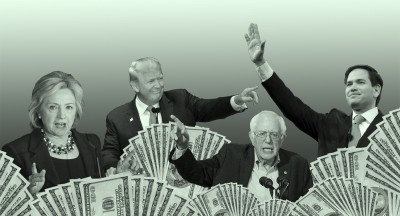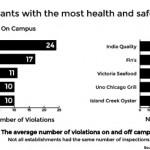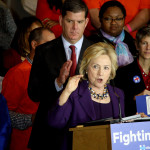
PHOTOS COURTESY OF BETSEY GOLDWASSER, ALEXANDRA WIMLEY, SARAH SILBIGER AND GAGE SKIDMORE/FLICKR
Boston residents poured nearly $1.2 million into the campaigns of those vying for the presidency in the upcoming 2016 election, according to a Daily Free Press review of 2015 campaign finance reports from the Federal Election Commission.
Approximately 2,500 donations from Boston went to the eight remaining candidates in the 2016 race. Former Secretary of State Hillary Clinton received 1,264 donations, Vermont Sen. Bernie Sanders trailed slightly behind with 1,052 and Florida Sen. Marco Rubio had 82 contributions from Boston residents.
The FEC sets a maximum donation of $2,700 for individuals per election, according to its website, but PACs and party committees can donate more on a yearly basis.
Seventeen state senators and legislators donated during the filing period. Sixteen of them gave to Clinton, and one gave to Rubio.
Boston City Councilor Josh Zakim and Boston Chief of Staff Daniel Koh donated $300 and $500, respectively, to Clinton. Massachusetts Port Authority CEO Thomas Glynn and Boston Medical Center CEO Kate Walsh also contributed the maximum amount to Clinton’s campaign.
Business leader John Fish, of Suffolk Construction Management, gave $2,700 to Republican candidate Rubio, while automobile dealer owner Ernie Boch Jr. gave $2,700 to Republican candidate and businessman Donald Trump.
In August, Boch hosted a fundraiser at his Norwood home and contributed approximately $86,937 to the Trump campaign, but a significant amount had to be returned, for it exceeded the donation maximum. This deduction is reflected on the FEC filings.
Those who previously held office, including former Massachusetts Attorney General Martha Coakley and former Massachusetts Govs. Deval Patrick and Michael Dukakis also donated to Clinton’s campaign.
Overall, the Bay State contributed nearly 22,000 donations, totaling close to $6 million. All of the donations in Massachusetts came from approximately 7,200 individuals.
Individuals are allowed to contribute multiple times until they reach the maximum. One donor gave 90 small donations to the Sanders campaign.
Sanders collected more than 10,000 total donations from Massachusetts, and a third of those were from individual donors. He raised nearly $1 million overall with an average individual donation amount of about $90. This number is higher the $27 average contribution Sanders boasts about in rallies and debates.
With the exception of Trump, all the candidates raised at least $100,000 and received at least 100 donations in the commonwealth. Trump garnered nearly $50,000 while Clinton collected more than $3.5 million.
Massachusetts donors gave 2 percent of all campaign donations completed within the 2015 filing period.
James Johnson, a history professor in the Boston University College of Arts and Sciences, said individuals donate to campaigns because they are attentive citizens.
“I think people donate because, this election in particular with the vacancy in the Supreme Court, the stakes are extremely high,” Johnson said. “And those of us who follow and care about the course of our country want to do everything possible.”
Johnson said it is not surprising to see a large number of Massachusetts residents donating to Democratic campaigns.
“It’s perhaps not surprising in the fact that much of the Democratic establishment is based in Boston,” Johnson said. “I also think that as the spotlight shifts from one primary state to another, those who are new to the political process will kind of wake up and look around, and maybe there would be a surge for Bernie Sanders.”
Jon Roberts, also a history professor in CAS, said the amount of money a candidate raises does not guarantee a win.
“There’s not necessarily a correlation between who gets the most donations and who finally triumphs in the primary,” Roberts said. “I think if there’s one thing that recent elections have demonstrated, it is that money can’t buy an election in all cases.”
Several residents emphasized the importance of keeping campaign donations public.
Nick Cyrus, 26, of Jamaica Plain, said transparency in regard to campaign donations is important.
“I think it’s important that all campaign donations are public,” he said. “People have to reveal when they’re giving their money to something so political, and it’s good that anyone can see that.”
Candice Brooks, 37, of Back Bay, said she was not surprised that a majority of donations from Boston went Clinton’s way.
“I think it’s interesting that … a majority of the money from the area is going towards Hillary,” she said. “She has a lot of supporters in the area, and I think it’s interesting to see when pockets of the country have a tendency to vote for the same person.”
Spencer Gregson, 29, of Brighton, noted how important it is for people to see when public officials are giving their money to political candidates.
“It’s cool to look at where the money is coming from,” he said. “I think it’s good to see when people who are common household names in the area have given plenty of money to one candidate.”
Vice Chairman and archives keeper for The Daily Free Press Board of Directors. Former news editor. I like data, politics, and higher education, but will write about anything.




